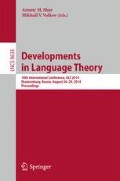Abstract
Under the assumption P≠NP, we prove that two natural problems from the theory of synchronizing automata cannot be solved in polynomial time. The first problem is to decide whether a given reachable partial automaton is synchronizing. The second one is, given an n-state binary complete synchronizing automaton, to compute its reset threshold within performance ratio less than d ln (n) for a specific constant d > 0.
Access this chapter
Tax calculation will be finalised at checkout
Purchases are for personal use only
Preview
Unable to display preview. Download preview PDF.
References
Alon, N., Moshkovitz, D., Safra, S.: Algorithmic construction of sets for k-restrictions. ACM Trans. Algorithms 2(2), 153–177 (2006)
Berlinkov, M.: Approximating the minimum length of synchronizing words is hard. Theory Comput. Syst. 54(2), 211–223 (2014)
Bonizzoni, P., Jonoska, N.: Regular splicing languages must have a constant. In: Mauri, G., Leporati, A. (eds.) DLT 2011. LNCS, vol. 6795, pp. 82–92. Springer, Heidelberg (2011)
Eppstein, D.: Reset sequences for monotonic automata. SIAM J. Comput. 19, 500–510 (1990)
Gerbush, M., Heeringa, B.: Approximating minimum reset sequences. In: Domaratzki, M., Salomaa, K. (eds.) CIAA 2010. LNCS, vol. 6482, pp. 154–162. Springer, Heidelberg (2011)
Lovász, L.: On the ratio of optimal integral and fractional covers. Discr. Math. 13, 383–390 (1975)
Martyugin, P.: Computational complexity of certain problems related to carefully synchronizing words for partial automata and directing words for nondeterministic automata. Theory Comput. Syst. 54(2), 293–304 (2014)
Olschewski, J., Ummels, M.: The complexity of finding reset words in finite automata. In: Hliněný, P., Kučera, A. (eds.) MFCS 2010. LNCS, vol. 6281, pp. 568–579. Springer, Heidelberg (2010)
Savitch, W.: Relationships between nondeterministic and deterministic tape complexities, J. Comp. System Sci. 4(2), 177–192 (1970)
Slavik, P.: A tight analysis of the greedy algorithm for set cover. In: Proc. 28th ACM Symp. on Theory of Computing, pp. 435–441 (1996)
Travers, N., Crutchfield, J.: Exact synchronization for finite-state sources. J. Stat. Phys. 145(5), 1181–1201 (2011)
Vojtěch, V.: Subset synchronization of transitive automata, arXiv:1403.3972 (accepted to AFL 2014)
Author information
Authors and Affiliations
Editor information
Editors and Affiliations
Rights and permissions
Copyright information
© 2014 Springer International Publishing Switzerland
About this paper
Cite this paper
Berlinkov, M.V. (2014). On Two Algorithmic Problems about Synchronizing Automata. In: Shur, A.M., Volkov, M.V. (eds) Developments in Language Theory. DLT 2014. Lecture Notes in Computer Science, vol 8633. Springer, Cham. https://doi.org/10.1007/978-3-319-09698-8_6
Download citation
DOI: https://doi.org/10.1007/978-3-319-09698-8_6
Publisher Name: Springer, Cham
Print ISBN: 978-3-319-09697-1
Online ISBN: 978-3-319-09698-8
eBook Packages: Computer ScienceComputer Science (R0)

